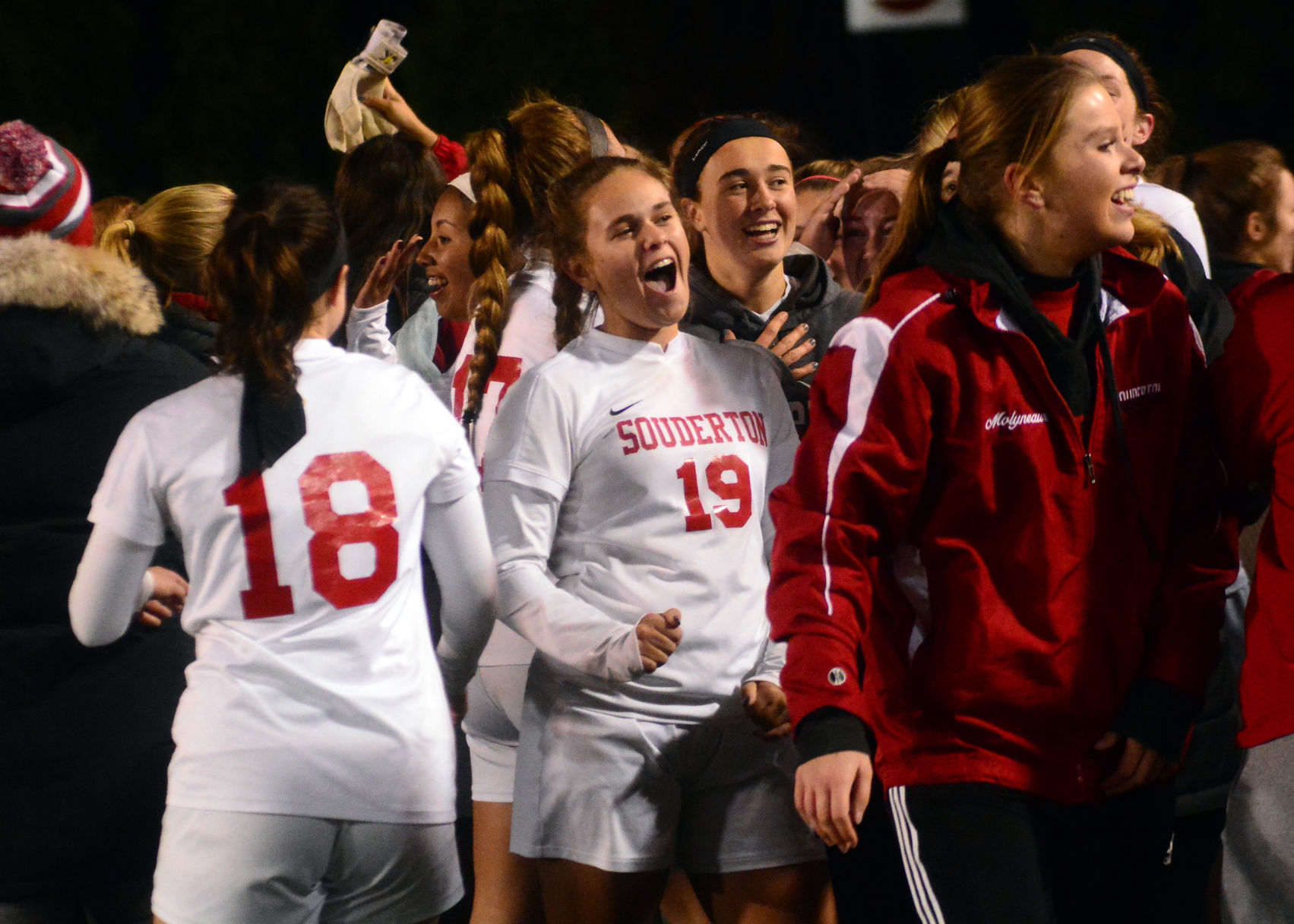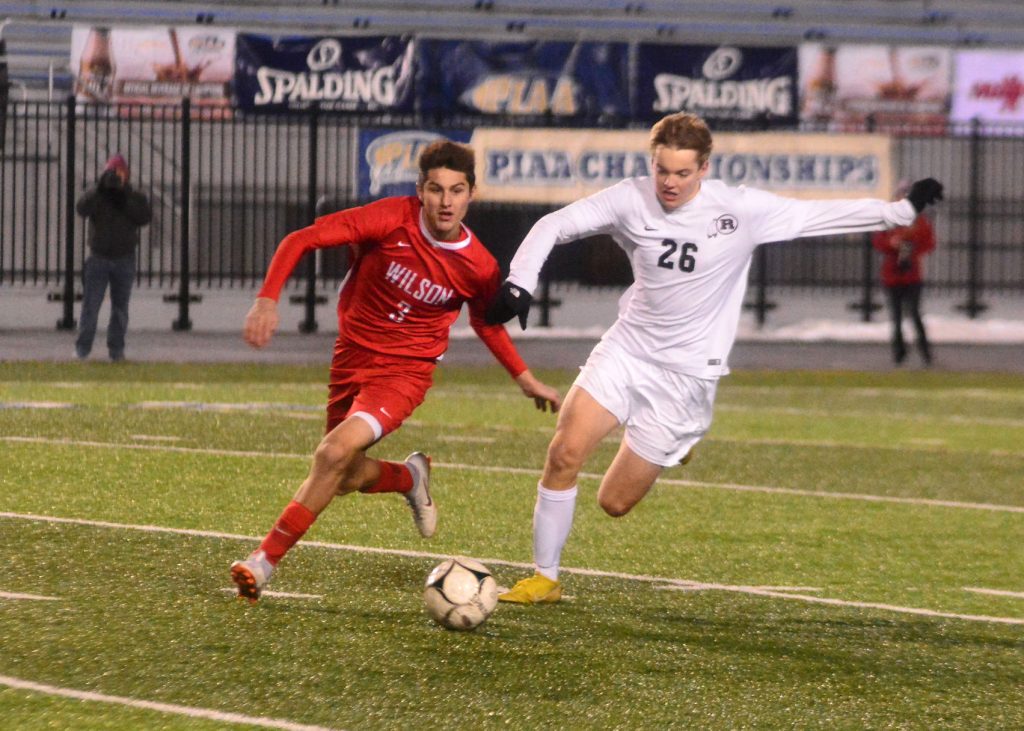
De George: Developmental Academies haven’t taken excitement from PIAA soccer finals
HERSHEY — Soccer is a cruel game, Strath Haven boys coach Ryan O’Neill was saying Friday night. He could’ve interchanged any number of modifiers into that sentence an evening later and had it ring painfully true for Radnor.
It can be heartbreaking or devastating or utterly baffling, as Radnor felt at HersheyPark Stadium, after Wilson’s Victor Vottero scored a maybe-but-maybe-not goal with 17 seconds left to decide their PIAA Class 4A final.
That contest also was something else that Radnor was unlikely to appreciate in its haze of disappointment: Thrilling.
The Radnor-Wilson game was the perfect capstone for the weekend in Hershey. Four of the eight finals required overtime. A fifth, Villa Joseph Marie’s Class 3A girls triumph, was decided in the final 10 minutes of regulation. And then there was Radnor’s controversial classic.

Not since 2013 (two of six finals) have multiple OT contests been required in the same year. Before that, 2007 was the last multiple-overtime championship weekend, and before that, 2000, in the ill-conceived era of co-champions.
The explosion in classifications skews the numbers, but more championships seem to breed more parity. The other factor exerting its gravity on the weekend’s competition was unseen and more consequential: The Developmental Academies.
The best players in Pennsylvania, flatly, don’t play scholastic soccer, particularly in the central and eastern parts of the states. Beyond the Philadelphia Union Academy, which only accepts boys players in the high school ages, organizations like PA Classics (boys and girls), Continental (formerly FC Delco, which is DA for boys only) and Penn Fusion (girls only) are siphoning many of the best players to DA competition, a schedule which posits high school games as merely lost practice time.
The pro-and-con list is the subject of fierce debate (and millions of dollars in fees sloshing through the system) that this space could hardly do justice to. As it pertains to high school soccer, it means that Pennsylvanians with the best chance of playing professionally will rarely get there via Hershey. The loss of high school’s team aspect is, in theory, aimed at building more complete players via the more intensive and consistent academy tutelage.
But it also means that the state championships are less a playground for the old guard of talent pipelines and instead open to more first-time participants. And if this weekend was any indication, it’s created immensely entertaining finals.
Four of the eight champs didn’t win their district tournaments. In nine states games featuring teams from the same district, the higher-seeded team won just five times. The game’s inherently slim margins foster the balance, no doubt, but it’s still remarkable.
The cast of 16 finalists featured some customary powers. Villa Joseph Marie won its 11th title. Strath Haven played in its seventh final, albeit its first in 17 years. Fleetwood won its third title, though the first since 2000. Nine programs were making their finals debuts; five of the eight champs toted home the gold trophy for the first time. (Villa Joe, for what it’s worth, was the only non-boundary finalist.)
Then there’s Bedford, representing District 5, which comprises the strip of land between Chambersburg and the Pittsburgh suburbs along the Maryland line, 22 schools in total in Fulton, Somerset and Bedford counties. That district had only won three titles in teams sports since 1990 – Meyersdale baseball in 2017, Fannett Metal softball in 2012 and McConellsburg girls soccer in Class A in 1991.
That it’s a different caliber of players and a rotating population of programs in Hershey doesn’t diminish the on-field stakes. You could see it in the jubilation of Averie Doughty, who capped a historic week with the clinching overtime goal to lead Souderton over rival Pennridge (after she had scored the equalizer, and overtime game-winner in the semifinals and hit a clutch penalty kick in the quarterfinal shootout). You could see it in the haunted face of Josh Savadove, who believed he had done enough to swipe Vottero’s shot off the line in the final minute. It was evident in how former Radnor coach Sam Holt described how many of his players from the 1980 team, which lost to Fleetwood in the state final, fired emails to each other about plans to watch the final, in person or in digital commiseration.
“It’s special to me too because there’s so much criticism directed toward high school soccer with the academies, and I don’t think there’s a more joyous moment playing soccer than going to a state championship,” Mike Barr, who won five state titles at Strath Haven and is the coach of Kennett, told me last week. “… We’ll forget who won state championships, but those kids will always remember and it’ll tie them into the future together. It’s quite a moment.”
The days of major college scouts making the PIAA championships a recruiting priority might be over. But schools have adapted. And those that have are granted a clearer path to a state-championship journey, an unforgettable – or at times, unforgettably cruel – ride.

